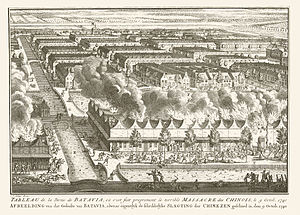
Back Sinofobie Afrikaans رهاب الصين Arabic Sinofobiya Azerbaijani চীনাভীতি Bengali/Bangla Sinofobia Spanish Sinofobia Basque چینیستیزی Persian סינופוביה HE चीन-विरोधी भावना Hindi Sinofobia ID

| Part of a series on |
| Discrimination |
|---|
 |

Anti-Chinese sentiment (also referred to as Sinophobia) is the fear or dislike of China, Chinese people and/or Chinese culture.[1][2][3][4]
The relative economic success of ethnic Han Chinese minority in South-East Asia has made them the object of envy and even resentment-driven violence.[5][6] In the western world, fear over the increasing international influence of China has helped drive persistent and selectively negative media coverage of China. This is often aided and abetted by policymakers and politicians.[7][8]
It is frequently directed at Chinese minorities which live outside China and involves immigration, nationalism, political ideologies, disparity of wealth, the past tributary system of Imperial China, majority-minority relations, imperial legacies, and racism.[9][10][11][note 1]
A variety of popular cultural clichés and negative stereotypes of Chinese people have existed around the world since the twentieth century, and they are frequently conflated with a variety of popular cultural clichés and negative stereotypes of other Asian ethnic groups, known as the Yellow Peril.[14] Some individuals may harbor prejudice or hatred against Chinese people due to history, racism, modern politics, cultural differences, propaganda, or ingrained stereotypes.[14][15]
- ^ Sinophobia is "Fear of or contempt for China, its people, or its culture" states The American Heritage Dictionary of the English Language, Online Edition. Retrieved July 12, 2012.
- ^ Macmillan dictionary. Retrieved July 7, 2022.
- ^ The Free Dictionary By Farlex. Retrieved July 7, 2022.
- ^ Collons Dictionary. Retrieved July 7, 2022.
- ^ hksspr (January 31, 2024). "Chinese-Indonesians Face Long Road to National Integration, Except During Elections". HKS Student Policy Review. Retrieved July 11, 2024.
- ^ "Minority Rights - Chinese in the Philippines". Minority Rights. October 16, 2023.
- ^ Harris, Lee (February 9, 2022). "Congress Proposes $500 Million for Negative News Coverage of China". The American Prospect. Retrieved July 11, 2024.
- ^ London, King's College. "Shaping the policy debate: How the British media presents China". King's College London. Retrieved July 11, 2024.
- ^ Cite error: The named reference
bbcindonesiawas invoked but never defined (see the help page). - ^ Cite error: The named reference
heraldsunwas invoked but never defined (see the help page). - ^ Cite error: The named reference
kazinwas invoked but never defined (see the help page). - ^ Chih-yu Shih; Prapin Manomaivibool; Reena Marwah (August 13, 2018). China Studies In South And Southeast Asia: Between Pro-china And Objectivism. World Scientific Publishing Company. p. 36.
- ^ 紀紅兵; 內幕出版社 (August 25, 2016). 《十九大不准奪權》: 反貪─清除野心家 (in Chinese). 內幕出版社. ISBN 978-1-68182-072-9.
... 第三點,作為獨立學者,與您分享下本人"反中不反華"的觀點。
- ^ a b William F. Wu, The Yellow Peril: Chinese Americans in American Fiction, 1850–1940, Archon Press, 1982.
- ^ "Conference Indorses Chinese Exclusion; Editor Poon Chu Says China Will Demand Entrance Some Day – A Please for the Japanese – Committee on Resolutions Commends Roosevelt's Position as Stated in His Message". The New York Times. December 9, 1905. p. 5. Retrieved February 21, 2010.
Cite error: There are <ref group=note> tags on this page, but the references will not show without a {{reflist|group=note}} template (see the help page).
© MMXXIII Rich X Search. We shall prevail. All rights reserved. Rich X Search